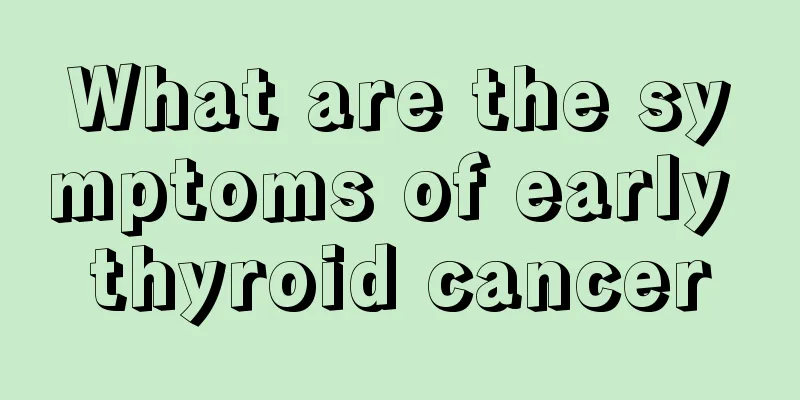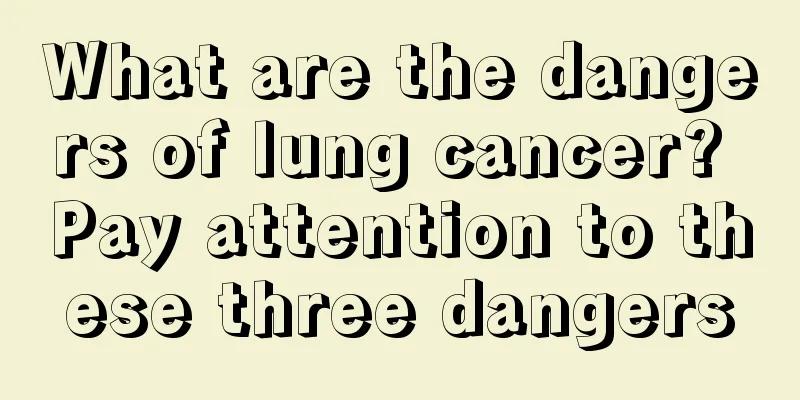What are the symptoms of early thyroid cancer

|
Early thyroid cancer should be treated as soon as possible. Common symptoms include neck lumps, hoarseness, and difficulty swallowing. Treatments include surgery, radiotherapy, and targeted drugs. Thyroid cancer may have no obvious symptoms in the early stages, but some patients will feel a painless lump in the neck. The lump is usually hard and can move up and down with swallowing. Hoarseness may be caused by tumor compression of the recurrent laryngeal nerve, while difficulty swallowing is caused by tumor enlargement compressing the esophagus. If these symptoms occur, it is recommended to seek medical attention in a timely manner for ultrasound, fine needle aspiration biopsy and other examinations to confirm the diagnosis. 1. Neck mass: The most common symptom of early thyroid cancer is a painless neck mass. The mass is usually hard, has unclear boundaries, and moves up and down with swallowing. If the mass grows rapidly or is fixed, be alert to the possibility of malignancy. Patients can check whether there is an abnormal mass in the neck by self-touch, and perform ultrasound examination for further confirmation if necessary. 2. Hoarseness: Thyroid cancer may compress or invade the recurrent laryngeal nerve, resulting in limited vocal cord movement and hoarseness. Hoarseness is usually gradual, and may manifest as a change in pitch in the early stages, and complete loss of voice in the later stages. If hoarseness persists for more than two weeks and there is no significant improvement, you should see a doctor as soon as possible to find out the cause. 3. Dysphagia: As the tumor grows, it may compress the esophagus, causing dysphagia. The patient may feel a sense of obstruction when food passes through the neck. The degree of dysphagia is related to the size and location of the tumor. In severe cases, it may affect normal eating. If dysphagia is accompanied by weight loss or malnutrition, you should seek medical attention for evaluation in a timely manner. The treatment of early thyroid cancer is mainly surgical, and the scope of resection includes the diseased thyroid tissue and surrounding lymph nodes that may be affected. After surgery, radiotherapy or targeted drug therapy can be selected according to the pathological results to reduce the risk of recurrence. Regular follow-up and thyroid function monitoring are important measures to prevent recurrence. Early detection and treatment are the key to improving the prognosis of thyroid cancer. It is recommended that those with related symptoms seek medical treatment as soon as possible and achieve long-term survival through standardized treatment. |
>>: Is congenital bile duct cyst scary?
Recommend
Are hemorrhoids contagious? Is it an infectious disease?
Hemorrhoids are medically known as hemorrhoidal d...
What harm does gasoline do to the skin?
Gasoline is the main fuel for transportation in l...
Four major dangers leading to bladder cancer
The occurrence of any cancer will cause serious h...
What are the main symptoms of chronic hepatitis?
Everyone knows the importance of the liver. At th...
What are the benefits of applying cooling oil on the inner thighs
In fact, for many people born in the 1980s who gr...
Will birthmarks be passed on to children?
Birthmarks are very common in life. Many people h...
Tumor recurrence after surgery is a "time bomb". Here are two tips to help you defuse it!
There is no medicine that works immediately, espe...
Is pancreatic cancer hereditary?
Pancreatic cancer is related to heredity, which c...
What are the treatments for mixed cerebral palsy
Many babies will have some slow reactions, stiff ...
At what age should pregnant women wear radiation protection clothing?
Compared with normal people, the female body duri...
My throat feels blocked when I get angry
Some people are particularly prone to losing thei...
How to treat prostate cancer
Prostate cancer is a tumor caused by malignant pr...
What harm does bladder cancer do to patients
There are many types of diseases, such as prostat...
Will eating coriander cause miscarriage?
Coriander is a common vegetable in our daily life...
Cervical Medicinal Pillow Recipe
Cervical spondylosis is a disease that many peopl...









